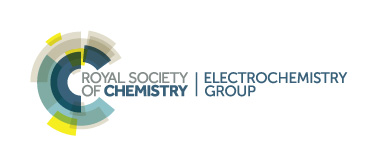Butler meeting 2020
IMPORTANT: The Butler meeting 2020 has been rescheduled and will take place as virtual event on 1st of September.
In order to attend, we kindly ask everyone to register via: https://www.eventbrite.co.uk/e/butler-meeting-2020-tickets-113968274176. This also contains the modified programme.
Poster presentations are organised using twitter poster presentations (#Butlermeeting2020). We will continue to have exciting prizes for the best oral and poster presentations.
The Butler meeting is a one-day symposium at which PhD students and PDRAs from across Scotland and the North of England can present the results of their research in electrochemistry and meet with their peers. Both oral and poster presentation slots will be available, but oral presentations are aimed at PhD students who might otherwise not get the opportunity to speak during their PhD studies. There will also be a keynote lecture at the end of the symposium by an academic of high standing in the field. The symposium is free to attend for all, thanks to the generosity of the RSC Electrochemistry Interest Group, the Scottish RSC local sections and our industrial sponsors.
Confirmed keynote speakers:
grew up in a small village in East Yorkshire, and went to South Hunsley School, which is to the west of Hull. In 2000 she went to the University of Oxford, studying for an MChem degree. In her fourth year project she worked for Prof Fraser Armstrong and became interested in how electricity can be harnessed to drive chemical reactions, particularly in Biology, as will be shown by this talk. stayed in the Armstrong research group to carry out a PhD from 2004-2008. was then awarded a 4-year Merton College Junior Research Fellowship in Chemistry at Oxford. In 2012, moved to the University of York as the Anniversary Research Lecturer in Chemistry and was made a Senior Lecturer by the University in 2017. She has been very happy setting up her research group and teaching in the Department. was awarded a 2013 Biochemistry Society Young Investigator award, and this year was awarded two Royal Society of Chemistry prizes, the Parsons Medal in Electrochemistry and the Edward Frankland Fellowship in Inorganic Chemistry.
Prof Jin Xuan (Loughborough University) - Professor Jin Xuan is a Personal Chair in Low Carbon Processes at Loughborough University since September 2019. He has published 100+ journal papers (including 4 Invited Articles, 2 ‘ESI 1% Highly Cited Papers’, 2 ‘Top 25 Hottest Article’ and 1 ‘Most Cited Article‘), 50+ conference papers and granted 9 patents. Dr Xuan has led/co-led £3M+ research grants, as the PI for the EPSRC First Grant on solar energy (EP/R012164/1), the PI for the ETP grant for Energy Storage Optimisation (PJ0179ES), the PI of Royal Society Research Grant (RSG\R1\180162) and Newton Advanced Fellowship (NAF\R1\180146) and the work package leader for the £1.8M EPSRC low carbon fuel project (EP/N009924/1). He also leads the UK team in the Global Innovation Initiative (GII) project for CO2-to-fuel microreactors with Yale University, Shell, and Chinese Academy of Sciences. He is the winner of 2015 Scottish Energy News Researcher of The Year Award (Energy Storage & Materials) and held the Royal Society Kan Tong Po International Fellowship.
Dr Mohammed Mamlouk (Newcastle University) - Dr Mohamed Mamlouk is a Senior Lecturer for the School of Engineering at University of Newcastle with an area of expertise in Electrochemical Engineering Science. He has over 16 years of experience in the field of electrochemical engineering, membrane science, and mathemical modelling of electrochemical systems. He holds a MSc in chemical engineering and process control from Newcastle University (2003) and a PhD in Electrochemical Engineering (2008, Newcastle University). In recent years, he has published 50+ papers in the field of energy conversion and storage, fuel cells, electrolysers and batteries, with over 1700 citations and a h-index of 28. He has been PI and co-I on a nmber of large EU/UK research projects, worth over >£3M. Conferences he has organised include CARISMA 2017, Electrochem UK 2015, and UKES2019. He has chaired several sessions in (inter)national conferences including 6th International Conference on Fundamentals and Development of Fuel Cells (Toulouse, 2015), Electrochemistry 2015 (Durham), and North East Centre for Energy and Materials Conference (Newcastle, 2019). Furthermore, he is a member of the SCI Electrochemical Technology group of which he is the honorary treasurer. He collaborates closely with industry and has done consultancy work for energy conversion and storage industry, including recent work with NewCell Technologies and Enocell Ltd.
Dr Damion Corrigan (Strathclyde University) - Dr Corrigan's areas of particular interest include: electrochemical impedance spectroscopy (EIS), microfabricated sensor system and microelectrode sensor arrays for multi target diagnostic assays. He has been awarded a Longitude Prize Discovery Award in recognition of his "Microplate" project, which is a rapid antibiotic susceptibility testing device he is currently working on. He joined Strathclyde in 2016 as a Lecturer and Chancellor's Fellow in Health Technologies. His background is in sensing and analytical chemistry, having obtained a PhD in Bioanalytical Chemistry from Cranfield University followed by periods of postdoctoral research at Southampton and Edinburgh universities. He has expertise in electrochemical sensing in harsh and extreme environments. His work is often highly interdisciplinary and involves multiple industrial partners, including GSK, Astra Zeneca, and the National Nuclear Laboratory.
Sponsors:
We would like to thank our (industrial) sponsors including Alvatek, Bio-Logic Science Instruments Ltd, IKA chemicals, Metrohm, and RSC Electrochemistry Interest group.






